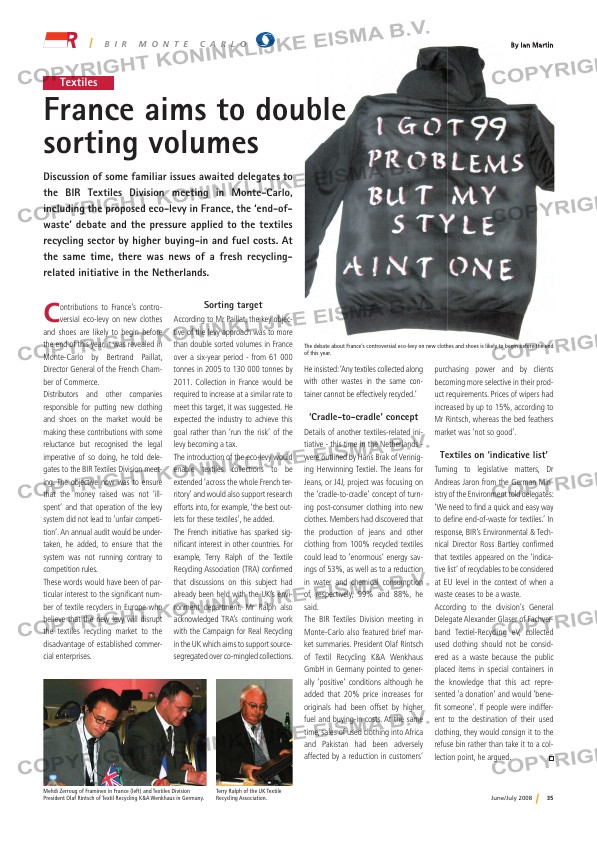Page 35 from: June / July 2008

35June/July 2008
C ontributions to France’s contro-versial eco-levy on new clothes
and shoes are likely to begin before
the end of this year, it was revealed in
Monte-Carlo by Bertrand Paillat,
Director General of the French Cham-
ber of Commerce.
Distributors and other companies
responsible for putting new clothing
and shoes on the market would be
making these contributions with some
reluctance but recognised the legal
imperative of so doing, he told dele-
gates to the BIR Textiles Division meet-
ing. The objective now was to ensure
that the money raised was not ‘ill-
spent’ and that operation of the levy
system did not lead to ‘unfair competi-
tion’. An annual audit would be under-
taken, he added, to ensure that the
system was not running contrary to
competition rules.
These words would have been of par-
ticular interest to the signifi cant num-
ber of textile recyclers in Europe who
believe that the new levy will disrupt
the textiles recycling market to the
disadvantage of established commer-
cial enterprises.
Sorting target
According to Mr Paillat, the key objec-
tive of the levy approach was to more
than double sorted volumes in France
over a six-year period – from 61 000
tonnes in 2005 to 130 000 tonnes by
2011. Collection in France would be
required to increase at a similar rate to
meet this target, it was suggested. He
expected the industry to achieve this
goal rather than ‘run the risk’ of the
levy becoming a tax.
The introduction of the eco-levy would
enable textiles collections to be
extended ‘across the whole French ter-
ritory’ and would also support research
efforts into, for example, ‘the best out-
lets for these textiles’, he added.
The French initiative has sparked sig-
nifi cant interest in other countries. For
example, Terry Ralph of the Textile
Recycling Association (TRA) confi rmed
that discussions on this subject had
already been held with the UK’s envi-
ronment department. Mr Ralph also
acknowledged TRA’s continuing work
with the Campaign for Real Recycling
in the UK which aims to support source-
segregated over co-mingled collections.
He insisted: ‘Any textiles collected along
with other wastes in the same con-
tainer cannot be effectively recycled.’
‘Cradle-to-cradle’ concept
Details of another textiles-related ini-
tiative – this time in the Netherlands –
were outlined by Hans Brak of Verinig-
ing Herwinning Textiel. The Jeans for
Jeans, or J4J, project was focusing on
the ‘cradle-to-cradle’ concept of turn-
ing post-consumer clothing into new
clothes. Members had discovered that
the production of jeans and other
clothing from 100% recycled textiles
could lead to ‘enormous’ energy sav-
ings of 53%, as well as to a reduction
in water and chemical consumption
of, respectively, 99% and 88%, he
said.
The BIR Textiles Division meeting in
Monte-Carlo also featured brief mar-
ket summaries. President Olaf Rintsch
of Textil Recycling K&A Wenkhaus
GmbH in Germany pointed to gener-
ally ‘positive’ conditions although he
added that 20% price increases for
originals had been offset by higher
fuel and buying-in costs. At the same
time, sales of used clothing into Africa
and Pakistan had been adversely
affected by a reduction in customers’
B I R M O N T E C A R L O By Ian Martin
Textiles
purchasing power and by clients
becoming more selective in their prod-
uct requirements. Prices of wipers had
increased by up to 15%, according to
Mr Rintsch, whereas the bed feathers
market was ‘not so good’.
Textiles on ‘indicative list’
Turning to legislative matters, Dr
Andreas Jaron from the German Min-
istry of the Environment told delegates:
‘We need to fi nd a quick and easy way
to defi ne end-of-waste for textiles.’ In
response, BIR’s Environmental & Tech-
nical Director Ross Bartley confi rmed
that textiles appeared on the ‘indica-
tive list’ of recyclables to be considered
at EU level in the context of when a
waste ceases to be a waste.
According to the division’s General
Delegate Alexander Glaser of Fachver-
band Textiel-Recycling eV, collected
used clothing should not be consid-
ered as a waste because the public
placed items in special containers in
the knowledge that this act repre-
sented ‘a donation’ and would ‘bene-
fi t someone’. If people were indiffer-
ent to the destination of their used
clothing, they would consign it to the
refuse bin rather than take it to a col-
lection point, he argued.
Mehdi Zerroug of Framinex in France (left) and Textiles Division
President Olaf Rintsch of Textil Recycling K&A Wenkhaus in Germany.
The debate about France’s controversial eco-levy on new clothes and shoes is likely to begin before the end
of this year.
Terry Ralph of the UK Textile
Recycling Association.
France aims to double
sorting volumes
Discussion of some familiar issues awaited delegates to
the BIR Textiles Division meeting in Monte-Carlo,
including the proposed eco-levy in France, the ‘end-of-
waste’ debate and the pressure applied to the textiles
recycling sector by higher buying-in and fuel costs. At
the same time, there was news of a fresh recycling-
related initiative in the Netherlands.
RI_012 BIR Textiles.indd 35 19-06-2008 16:13:08



